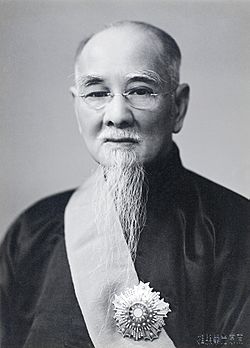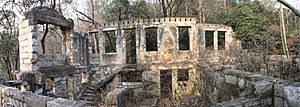Lin Sen facts for kids
Quick facts for kids
Lin Sen
|
|
|---|---|
|
林森
|
|
 |
|
| Chairman of the National Government of China | |
| In office 15 December 1931 – 1 August 1943 |
|
| Premier | Chen Mingshu (acting) Sun Fo Wang Jingwei Chiang Kai-shek H.H. Kung |
| Military chief | Chiang Kai-shek |
| Preceded by | Chiang Kai-shek |
| Succeeded by | Chiang Kai-shek (acting) |
| President of the Legislative Yuan | |
| In office 2 March 1931 – 1 January 1932 |
|
| Vice President | Shao Yuanchong |
| Preceded by | Hu Hanmin |
| Succeeded by | Shao Yuanchong (acting) Zhang Ji |
| Vice President of the Legislative Yuan | |
| In office 8 October 1928 – 2 March 1931 |
|
| President | Hu Hanmin |
| Preceded by | Position established |
| Succeeded by | Shao Yuanchong |
| Personal details | |
| Born | 16 March 1868 Minhou, Province of Fukien, Qing Dynasty |
| Died | 1 August 1943 (aged 75) Chungking, China |
| Nationality | Republic of China |
| Political party | Kuomintang (Western Hills faction) |
| Awards | Order of Brilliant Jade |
Lin Sen (Chinese: 林森; pinyin: Lín Sēn; born March 16, 1868 – died August 1, 1943) was an important Chinese politician. He served as the Chairman of the National Government of the Republic of China from 1931 until his death. This role was similar to being the head of the country.
Contents
Lin Sen's Early Life and Political Start

Lin Sen was born into a middle-class family in Shanggan Township, Minhou County, Fuzhou. He received his education from American missionaries. In 1884, he started working in the Telegram Bureau in Taipei, Taiwan.
After the First Sino-Japanese War, Lin Sen fought against the Japanese who had taken over Taiwan. He used a fighting style called guerrilla warfare, where small groups use surprise attacks. In 1902, he returned to mainland China and worked in the Shanghai customs office. He also lived in places like Hawaii and San Francisco for a time.
Joining the Revolutionaries
In 1905, Lin Sen joined the Tongmenghui, a group that wanted to overthrow the old Qing Dynasty and create a republic. He became an important organizer for the Kuomintang (KMT), which grew out of the Tongmenghui. During the Xinhai Revolution, which ended the Qing Dynasty, he led a revolt in Jiangxi.
He later became the speaker of the senate in China's new National Assembly. When a revolt against President Yuan Shikai failed, Lin Sen fled to Japan with Sun Yat-sen, a key leader of the revolution. He helped raise money for the party from Chinese people living abroad.
Becoming China's Head of State
In 1931, there was a big disagreement within the Kuomintang party. The leader, Chiang Kai-shek, arrested another important official, which made many people angry. Lin Sen and other high-ranking officials called for Chiang to be removed from his position.
The Japanese invasion of Manchuria helped prevent a civil war from starting in China. However, it did lead Chiang Kai-shek to step down on December 15. Lin Sen was then chosen to take his place as the acting chairman. He officially became the Chairman of the government on January 1, 1932.
A Respected Leader
Lin Sen was chosen because people respected him greatly. He had very little actual power, as the Kuomintang wanted to avoid one person having too much control, like Chiang Kai-shek had. Lin Sen chose to live in a simple rented house instead of the grand Presidential Palace, where Chiang Kai-shek still lived.
Soon after becoming chairman, Lin Sen traveled to many countries, including the Philippines, Australia, the United States, and parts of Europe. He visited Chinese communities and Kuomintang groups in these places. This was the first time a Chinese head of state had traveled overseas while in office.
Even though he didn't have much power over government decisions, Lin Sen was highly respected by the public. He was seen as a wise and honest elder statesman who stayed out of political fights. He was known for not being interested in power, corruption, or favoring his family, which was very rare at the time. His presence brought a sense of dignity and stability to the government during a time of change.
Promoting Family Values and Unity
Lin Sen was a widower, meaning his wife had passed away. He used his position to encourage people to have only one spouse. He helped make it a crime to have multiple wives or partners in 1935.
When Chiang Kai-shek was kidnapped during the Xi'an Incident, Lin Sen called for a peaceful solution. He strongly believed in national unity, especially as relations with Japan became worse.
When the Second Sino-Japanese War began in 1937, Lin Sen moved to Chongqing, which became the wartime capital. He officially allowed civilians to use guerrilla warfare, though it was already happening widely. He refused all offers to work with the Japanese puppet government, showing his loyalty to China.
Lin Sen's Final Years and Legacy
On March 10, 1943, Lin Sen was in a car accident. Two days later, he had a stroke while meeting with a group from Canada. While he was recovering, he strongly suggested that Taiwan should be returned to China after the war. This idea was included in the 1943 Cairo Declaration a few months later.
Lin Sen passed away on August 1, 1943, at the age of 76. The country declared a month of mourning for him. He was the longest-serving head of state for the Republic of China while it still controlled mainland China. After his death, Chiang Kai-shek was elected chairman, and the powers of the position were fully restored for him.
Lin Sen once visited Qingzhi ("Green Plant") Mountain in Lianjiang County and loved it so much that he called himself "Old Man Green Plant." His monument, built near Qingzhi Mountain in 1926, was damaged during the Cultural Revolution but was fixed in 1979.
Roads and Recognition
Today, there are roads named after Lin Sen in cities across Taiwan, such as Taipei, Kaohsiung, and Tainan. These roads honor his role in fighting against the Japanese and his time as president of the Republic of China.
In the People's Republic of China, Lin Sen was criticized for being against communism. However, after the Cultural Revolution, his reputation was improved, and he is now seen in a more positive light.
See also
 In Spanish: Lin Sen para niños
In Spanish: Lin Sen para niños
- Jieshou Park
 | James Van Der Zee |
 | Alma Thomas |
 | Ellis Wilson |
 | Margaret Taylor-Burroughs |

